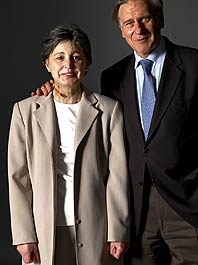
Patient: Maria Romero, 50
Doctor: Valentin Fuster, cardiologist, Mount Sinai Medical Center
Romero: I came to America from Spain twenty years ago. I’m a stay-at-home mom, so I do the shopping, make dinner, and take care of my husband and daughter. I love to cook Spanish food, particularly seafood, especially after church. I’m a simple person—little things like gardening and watching my daughter grow up make me happy. Then I became ill, and my life changed completely.
Fuster: I first saw Maria in 2002 because she was experiencing significant fatigue when she exercised. She said she’d had a heart murmur since birth, but I discovered that she had a complex congenital disease. She had two leaky valves and two holes in her heart, and blood was leaking into her lungs instead of her body, causing the blood pressure in her lungs to rise significantly. I wanted her to stay the next day so that I could finish my diagnosis, but she went home—against my recommendation.

1. Conductor, 89, With Heart Problems, Too Old and Sick for Surgery2. Firefighter Separates Spine From Skull3. Taxi Driver Survives Testicular Cancer4. Baby With Severe Back and Rib Problems5. College Student Going Blind in Both Eyes6. Factory Worker Loses Hands7. Hockey-Mad 5-Year-Old Has Potentially Fatal Tumor8. Woman Carrying Triplets Has Torn Aorta9. Woman Needs Heart and Lung Transplant10. Hip-Replacement Complications May Cost a Woman Her Leg11. Four Siblings With Potentially Fatal Kidney Disease

Romero: I didn’t want to have surgery—I was scared. They gave me an oxygen tank to use when I needed it and also medicine to take, which I did for two years, but in 2004 I started retaining water in my legs and I was very weak and throwing up. I couldn’t cook or clean the house anymore. I was admitted to the hospital in July of that year because my breathing was so labored.
Fuster: I had been calling Maria every six months while she was at home, pointing out that she was going to be in big trouble if she didn’t come back in. She was finally forced to come back to the hospital in 2004—she was very short of breath, very blue, and in poor shape. Her heart was in terrible condition, and the pressure in her lungs was way too high. Her only option was to have a heart-lung transplant—she’d never make it without one. This is an extremely rare operation—there were only 39 done in the United States in 2004, and it carries a high mortality rate. Still, we wanted to take on that risk because it was Maria’s only chance to live. But again, she refused.
Romero: I didn’t want to go through with it because I was thinking the worst. But the medicine wasn’t strong enough, and my lungs started filling with water and I couldn’t walk or leave the house.
Fuster: Maria got very sick again in mid-2005. Frankly, she was almost dead. I kept trying to convince her to consider the transplant, and she finally relented.
Romero: It just hit me—I didn’t want my daughter to grow up without me. They called on Easter day and told me they had the organs.
Fuster: Maria was bedridden and hooked up to an IV when the organs came from Ohio, and we were lucky they were the right size—Maria’s a very small person. The surgery took about five hours—because you’re transplanting two organs instead of one, there’s a much higher risk that the new organs will be unable to take over. Our team of surgeons put Maria on artificial circulation, so a machine was pumping her blood and oxygenating her brain. Then they removed her heart and lungs, which were so badly diseased they looked almost petrified. The new organs were inserted as a block and then sutured to her main arteries. We were all tense after Maria was taken off the machine, but her new heart started beating again quickly. All of her pressures stabilized quickly, too. She now has a 50 percent chance of being alive in five years, which is pretty good, considering how sick she was.
Romero: I left the hospital after a month. I have no pain and I walk all the time. I’m the happiest I’ve ever been, and I feel so grateful to the doctors. I can take care of my daughter and my husband, instead of the other way around, and soon I’ll have the strength to cook our Sunday seafood feast. Dr. Fuster is definitely invited. Next: Hip-Replacement Complications May Cost A Woman Her Leg